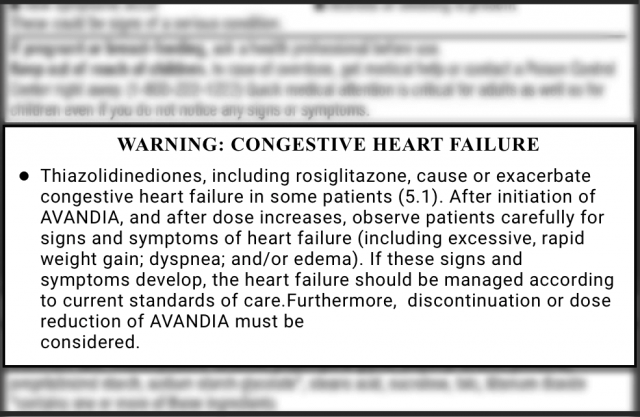Avandia Side Effects
The most frequently reported Avandia side effects include heart attack, congestive heart failure, stroke and coronary artery disease, accounting for nearly 90% of adverse events. Because of these risks, doctors seldomly prescribe Avandia for Type 2 Diabetes treatment.
Article Continues Below

Board-certified physicians medically review Drugwatch.com content to ensure its accuracy and quality.
Drugwatch.com partners with Physicians’ Review Network Inc. to enlist specialists. PRN is a nationally recognized leader in providing independent medical reviews.
Reviewer specialties include internal medicine, gastroenterology, oncology, orthopedic surgery and psychiatry.
Drugwatch.com has been empowering patients for more than a decade
Drugwatch.com has provided reliable, trusted information about medications, medical devices and general health since 2008. We’ve also connected thousands of people injured by drugs and medical devices with top-ranked national law firms to take action against negligent corporations.
Our team includes experienced medical writers, award-winning journalists, researchers and certified medical and legal experts. Drugwatch.com is HONCode (Health On the Net Foundation) certified. This means the high-quality information we provide comes from credible sources, such as peer-reviewed medical journals and expert interviews.
The information on Drugwatch.com has been medically and legally reviewed by more than 30 expert contributors, including doctors, pharmacists, lawyers, patient advocates and other health care professionals. Our writers are members of professional associations, including American Medical Writers Association, American Bar Association, The Alliance of Professional Health Advocates and International Society for Medical Publication Professionals.
About Drugwatch.com
- Assisting patients and their families since 2008.
- Helped more than 12,000 people find legal help.
- A+ rating from the Better Business Bureau.
- 5-star reviewed medical and legal information site.
Testimonials
"Drugwatch opened my eyes to the realities of big pharmacy. Having a family member with major depression and anxiety, I was looking for information on her medications. I found information that was very helpful, that her psychiatrist never told her."
- Common Side Effects
- Upper respiratory tract infection, weight gain, swelling and headache
- Serious Side Effects
- Liver failure, bone fractures, heart failure, elevated liver enzymes, vision problems, severe changes in blood sugar levels and an increased risk of pregnancy, especially in those who have had irregular periods
Latest Side Effects Information for Avandia
As of June 2024, heart attack, congestive heart failure, stroke and coronary artery disease were the most common Avandia (rosiglitazone) side effects reported to the U.S. Food and Drug Administration. These four conditions account for 89.4% of all Avandia adverse events reported to the FDA.
- Heart Attack: 35.86%
- Congestive Heart Failure: 27.86%
- Stroke: 15.66%
- Coronary Artery Disease: 10.02%
- All Others: 10.6%
A 2007 article by cardiologist Steven Nissen and Kathy Wolski of the Cleveland Clinic first exposed Avandia’s association with heart-related severe side effects. Other studies have linked the drug to liver failure and an increased risk of pregnancy.
Of the more than 93,000 adverse events reported to the FDA, the agency classifies over 87% as “serious.”
| FDA Adverse Event Reports for Avandia Side Effects | |
|---|---|
| Total cases reported | 93,820 |
| Serious cases (including deaths) | 81,975 |
| Deaths | 13,691 |
Disclaimer: Reports submitted to the FDA do not necessarily indicate that the drug caused an adverse event. It is important to consult with a healthcare professional before changing your medication.
After Avandia was linked to heart-related side effects, its popularity plummeted. Due to these risks, the FDA temporarily imposed a restricted access program called Risk Evaluation and Mitigation Strategy (REMS) in 2011, severely limiting its prescription.
Other side effects of Avandia include bone fractures, liver toxicity, edema, weight gain, vision problems and unexpected pregnancy risks.
“In my clinical practice, the most worrisome adverse effects of Avandia are congestive heart failure, myocardial infarction and liver problems,” Dr. Michael McKinney, primary physician of the medical weight loss center Healthy Outlook, told Drugwatch.
- Abdominal pain
- Bone fracture
- Dark urine
- Discomfort in the chest that feels like pressure, squeezing, fullness, or pain
- Menstrual cycle changes
- Pain or discomfort in the arms, back, neck, jaw, or stomach
- Persistent nausea or vomiting
- Shortness of breath
- Swelling or weight gain
- Vision problems
- Yellowing of the eyes or skin
Manufacturer GlaxoSmithKline allocated billions of dollars to resolve thousands of Avandia lawsuits, alleging that the company concealed the risks of heart attack and cardiac death from the public.
Less common adverse effects may include swelling, hypertension, upper respiratory tract infection, headache, back pain, high blood sugar, fatigue, sinusitis, diarrhea and low blood sugar.
Avandia remains on the market in the United States.
Case Study: Avandia Blamed for Serious Irregular Heartbeat
In February 2006, Sheila E. Schrank, a patient with diabetes, began taking Avandia to manage her Type 2 diabetes. Her doctor prescribed Avandia to help control her blood sugar levels.
Arrhythmia Side Effects
According to court records, soon after starting the medication, Schrank experienced severe arrhythmia, a potentially life-threatening irregular heartbeat. This serious side effect necessitated her admission to Long Island Jewish Hospital.
Medical Intervention
At the hospital, doctors promptly discontinued Schrank’s Avandia treatment and replaced it with insulin. This change in her medication regimen proved effective, as her arrhythmia subsided shortly after the switch. This incident underscores the need for careful monitoring of patients starting new medications, especially those with known potential side effects.
Heart Health Concerns Lead to FDA Restrictions
FDA warnings and restrictions on Advandia have fueled the medication’s plummeting popularity. In 2007, the FDA required a black box warning about its potential to cause or worsen congestive heart failure.

Source: Avandia Prescribing Information
The FDA’s REMS that restricted the amount of prescriptions, negative reports and increased medical skepticism drastically reduced Avandia’s use in treating type 2 diabetes.
“The basic plot of the rosiglitazone story quickly became obvious to the advisory committee: a new ‘wonder drug,’ approved prematurely and for the wrong reasons by a weakened and underfunded government agency subjected to pressure from industry, had caused undue harm to patients,” Dr. Clifford J. Rosen, the joint committee chair, wrote in
The New England Journal of Medicine. “The rosiglitazone story thus carries lessons for scientists, practitioners, and regulators alike.”
The FDA discontinued their REMS in 2015 after manufacturers updated the label warnings about heart failure and provided educational training to doctors about its risks. Health professionals must monitor patients for rapid weight gain, breathing issues and swelling.
“I equip my clients with knowledge about the signs of heart failure such as difficulty in breathing and swelling in their lower extremities while stressing the importance of seeking immediate medical attention should any of these symptoms occur,” McKinney said.
Bone Fractures
Avandia showed an increased incidence of bone fractures in clinical trials, according to the drug’s label.
Long-term trials found increased bone fracture risk in patients taking Avandia, especially women. Unlike typical osteoporosis sites which are in the spine, hips and wrist, fractures caused by Avandia often occur in the upper arm, hand and foot.
This fracture risk persisted beyond the first year of treatment. Patients should monitor and maintain bone health while on Avandia.

Source: Avandia Prescribing Information
In a study published in the
Archives of Internal Medicine, Swiss researchers found that patients with diabetes on thiazolidinediones, the drug class Avandia belongs to, had double the odds of fractures compared to patients who did not use these drugs. Those who took the drugs for over a year had an even higher risk of bone fracture, especially in the hip and wrist. The study compared the records of 1,020 patients with diabetes with fractures against a control group of people with diabetes who did not have fractures.
“This analysis provides further evidence of a possible association between long-term use of [the drugs] and fractures, particularly of the hip and wrist, in patients with diabetes mellitus,” the authors wrote.
Liver Toxicity
Avandia’s label warns of possible liver toxicity and against prescribing it to people with a history of liver problems. It also instructs doctors to check patients’ liver before and while on the drug.
A study in the journal LiverTox concluded that while Avandia is linked to rare instances of liver injury, it has a much lower rate of liver enzyme elevation and clinically apparent liver injury compared to troglitazone — an antidiabetic and anti-inflammatory drug in the same drug class. Most liver issues resolved after stopping the medication, though there have been reports of fatal cases, according to the study.

Source: Pharmacoepidemiology & Drug Safety
Another case series in Pharmacoepidemiology & Drug Safety suggested that rosiglitazone and pioglitazone (Actos) may cause liver problems, citing 21 cases of drug-associated liver failure reported to the FDA between 1997 and 2006.
“This is the largest case series of liver failure associated with rosiglitazone or pioglitazone reported to date, strengthening the evidence that these drugs can cause severe hepatotoxicity [liver damage],” the authors wrote.
Doctors should be cautious about continuing treatment in patients with mild liver enzyme elevations and monitor them closely.
Case Study: Acute Hepatitis After Eight Days of Avandia Therapy
A 61-year-old man with diabetes started taking rosiglitazone. He had a history of poorly controlled diabetes and had negative reactions to other diabetes medications, according to a case presented in LiverTox.
Symptoms and Diagnosis
After eight days on the medication, he experienced anorexia, nausea, abdominal pain, dark urine and jaundice. His liver tests were normal before rosiglitazone, but 11 days later, they showed significant damage. He was hospitalized for a week, and he stopped taking rosiglitazone. Tests for hepatitis were negative, and the medical staff found no gallstones.
Outcome
The patient’s liver tests returned to normal two months later. This case suggests rosiglitazone can cause acute liver injury, especially in those with previous adverse reactions to similar drugs.
Other Possible Side Effects
Avandia is linked to other potential side effects such as swelling, vision problems, blood and blood sugar effects, increased pregnancy risk, anemia and weight gain, according to a 2022 StatPearls article by Bryan S. Quintanilla Rodriguez and Ricardo Correa.
- Anemia
- Anemia was more common in patients taking Avandia, particularly at higher doses and in combination with metformin, occurring in up to 7.1% of patients. These cases were generally mild to moderate and rarely required stopping the medication.
- Blood and Blood Glucose Effects
- Patients on Avandia with other hypoglycemic agents (drugs that lower blood sugar) are at a higher risk of hypoglycemia, requiring dose adjustments. Regular monitoring of one’s blood glucose, hemoglobin A1c and white blood cell count are essential. Blood glucose reduction may take 2 weeks, with full effects in 2-3 months.
- Edema (Swelling)
- Avandia may cause fluid retention, leading to edema and potential heart failure. Use cautiously in patients at risk for heart failure and monitor for symptoms. Edema is more common at higher doses and in combination with insulin.
- Macular Edema
- Avandia can cause macular edema — swelling at the back of the eye — leading to blurred vision or decreased visual acuity. This condition often improves after stopping the drug. Patients with diabetes should have regular eye exams and report any visual changes immediately.
- Ovulation and Pregnancy
- Avandia can cause ovulation in premenopausal women, leading to unintended pregnancies. Women should discuss birth control options with their doctor or other health care provider and inform them immediately if they become pregnant while taking Avandia.
- Weight Gain
- Avandia can cause weight gain due to fluid retention and fat accumulation. Medical professionals should access those who experience a rapid weight increase for fluid accumulation and related issues like edema and heart failure.
Avandia Alternatives
Because there are many Avandia alternatives, the right treatment for you depends on your heart health, the side effects of each alternative, the cost and insurance coverage, the type of diabetes you have and the effectiveness of each drug.
- Actos (pioglitazone)
- Amaryl (glimepiride)
- DiaBeta, Glynase (glyburide)
- Farxiga (dapagliflozin)
- Glucotrol XL (glipizide)
- Glumetza, Glucophage (metformin)
- Insulin
- Invokana (canagliflozin)
- Januvia (sitagliptin)
- Jardiance (empagliflozin)
- Onglyza (saxagliptin)
- Ozempic (semaglutide)
- Rybelsus (semaglutide)
- Tradgenta (linagliptin)
- Victoza (liraglutide)
“I consider alternatives such as metformin, DPP-4 inhibitors, like sitagliptin, or GLP-1 receptor agonists, such as liraglutide, for patients at higher risk of the severe side effects of Avandia,” McKinney told Drugwatch.
“The choice to go for other medication depends on the patient’s total profile, including their cardiovascular risks, kidney functionality and personal choices,” McKinney said.
“Metformin is always my first option because it has an improved safety record compared with other oral agents and clinical outcome trials show that it reduces macrovascular complications in diabetics.”
A frank conversation with your doctor can help them determine your best alternative.
Editor Lindsay Donaldson contributed to this article.
Calling this number connects you with a Drugwatch.com representative. We will direct you to one of our trusted legal partners for a free case review.
Drugwatch.com's trusted legal partners support the organization's mission to keep people safe from dangerous drugs and medical devices. For more information, visit our partners page.


